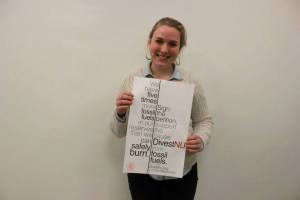By Ruthanne Bandy & Suzie Kim
For Dr. Sarah Finn, incorporating service-learning into one of her courses has been a goal for many years. Finn has a doctorate in Composition and Rhetoric Studies from the University of Massachusetts at Amherst where she completed her dissertation research on student activism and writing. Finn examined how student activists went through their writing process using their background in activism. She analyzed pieces of writing from student activists and interviewed them about their writing process. Finn found that “emotion is really important to take into account, that first emotion that sparks the writing.” From this research she became better informed about how to teach the writing process more effectively, while getting students more active and engaged.

As she worked on her dissertation, Finn remembers thinking, “‘wouldn’t it be great if there was a service-learning course that puts students into campus student activist groups?’” This semester, her idea came to life by partnering with the Service-Learning Program to provide a new course: First-Year Writing: Science, Technology, & Human Values. This course is designed to focus on writing as a vehicle for creating social change. As such, students enrolled in this course are expected to complete weekly blogs and four major projects integrating direct participation in a Northeastern-based student group committed to social change and innovation.
For this course, the service-learning engages students in the Northeastern campus and its connection to larger organizations. At the beginning of the semester, each student chose a student activist organization with which to partner. Finn defines a student activist organization as, “a student-run group that strives to make a positive difference.” Students are working with Husky Environmental Action Team (HEAT), GlobeMED, Slow Food, Enabling Engineering, Global Medical Brigades, and the Progressive Student Alliance.

One benefit of incorporating service-learning into an academic class is the support of a Service-Learning Teaching Assistant (S-LTA). For Finn, having an S-LTA has been a tremendous asset. This semester, senior International Affairs and Environmental Studies combined major Emma Clouse has been vital to the implementation of service-learning within this course through her role as an S-LTA. As a student activist herself, she was able to help connect students with many activist organizations on campus. Beyond her role as a liaison, Clouse also assists with facilitating discussions, planning lessons, and introducing reflection activities to the class. Finn says, “I think it’s really nice that the students can see someone around their age that’s doing all this important work and is there for them in the classroom.”
The course culminates in a final project focusing on a social problem informed by their semester’s work with the student groups. Students are required to make an argument that it is a significant problem that needs more awareness, identify the root causes of the problem, and identify what kind of actions can be made. Finn states that emotion can be used in a thoughtful and mindful way that helps the entire writing process. Most importantly Finn says, “I encourage my students to write what they care about.”


Congratulations to you and your students, Sarah.
LikeLike
Nice work, Sarah!
LikeLike
I really enjoyed reading this article!
LikeLike